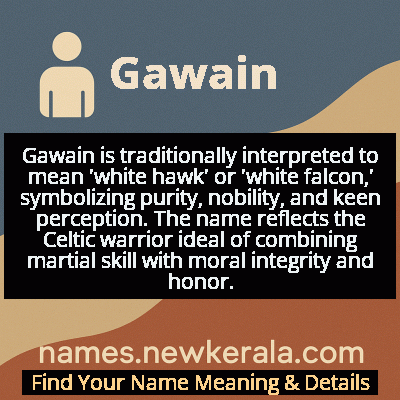Gawain Name Meaning & Details
Origin, Popularity, Numerology Analysis & Name Meaning of Gawain
Discover the origin, meaning, and cultural significance of the name GAWAIN. Delve into its historical roots and explore the lasting impact it has had on communities and traditions.
Name
Gawain
Gender
Male
Origin
Celtic
Lucky Number
1
Meaning of the Name - Gawain
Gawain is traditionally interpreted to mean 'white hawk' or 'white falcon,' symbolizing purity, nobility, and keen perception. The name reflects the Celtic warrior ideal of combining martial skill with moral integrity and honor.
Gawain - Complete Numerology Analysis
Your Numerology Number
Based on Pythagorean Numerology System
Ruling Planet
Sun
Positive Nature
Leaders, ambitious, highly driven, self-reliant, innovative.
Negative Traits
Overly aggressive, domineering, impatient, selfish.
Lucky Colours
Red, orange, gold.
Lucky Days
Sunday.
Lucky Stones
Ruby, garnet.
Harmony Numbers
2, 3, 9.
Best Suited Professions
Entrepreneurs, managers, engineers.
What People Like About You
Courage, determination, leadership.
Famous People Named Gawain
Sir Gawain
Knight of the Round Table
Central figure in Arthurian legends, known for his chivalry and the Green Knight quest
Gawain Douglas
Scottish Bishop and Poet
Pioneering Scottish Renaissance poet and translator of classical works
Gawain Bell
Colonial Administrator and Scholar
Final British Governor of Northern Nigeria and respected Arabist
Name Variations & International Equivalents
Click on blue names to explore their detailed meanings. Gray names with will be available soon.
Cultural & Historical Significance
Gawain's cultural significance extends beyond mere knightly tales to represent deeper philosophical questions about honor, truth, and human fallibility. The Green Knight narrative serves as an allegory for facing mortality and the importance of honesty in the face of certain death. His character demonstrates that true nobility comes not from perfection but from the courage to acknowledge one's flaws and continue striving for virtue. This makes Gawain one of the most psychologically complex and enduring characters in Western literature, bridging Celtic warrior traditions with medieval chivalric ideals in a way that continues to resonate across centuries.
Extended Personality Analysis
Individuals bearing the name Gawain are typically associated with a strong moral compass and innate sense of honor. They tend to be principled, reliable, and deeply committed to their word, much like their Arthurian namesake who honored his deadly promise to the Green Knight. There's often a natural nobility in their demeanor - they carry themselves with dignity while remaining approachable and courteous to others. Gawains are frequently seen as peacemakers and diplomats, able to navigate conflicts with wisdom and tact while maintaining their core values intact.
Beneath this composed exterior, however, lies considerable inner strength and resilience. Like the literary Gawain who faced certain death with courage, modern bearers of the name often demonstrate remarkable fortitude when confronting challenges. They may possess a perfectionist streak and high self-expectations, sometimes struggling with the gap between ideal behavior and human limitations. Their leadership style tends to be inspirational rather than authoritarian, earning loyalty through example rather than command. The name suggests someone who, while not flawless, possesses the self-awareness and determination to grow from their mistakes and continually strive toward their personal code of honor.
Modern Usage & Popularity
In contemporary times, Gawain remains a distinctive and uncommon choice, primarily selected by parents with appreciation for Arthurian literature or Celtic heritage. The name has maintained a consistent but low-level usage pattern, never breaking into mainstream popularity charts, which preserves its unique and literary character. Recent decades have seen slight fluctuations in usage, often corresponding with cultural events like film adaptations or renewed interest in medieval literature. It's particularly favored in the United Kingdom and among communities with Welsh connections, though it appears sporadically in other English-speaking countries. The name appeals to modern parents seeking a strong, historical name with deep cultural roots that stands apart from more common choices, while its association with noble qualities makes it an attractive option for those valuing character and tradition in naming.
Symbolic & Spiritual Meanings
Gawain carries profound symbolic weight as a representation of the human journey toward integrity and self-knowledge. The name embodies the tension between ideal virtue and human imperfection, symbolizing that true honor is forged through testing and self-confrontation rather than innate perfection. Like the white hawk suggested by its etymology, Gawain represents keen vision and noble aspiration - the ability to see truth clearly while striving for higher principles. The Green Knight narrative adds layers of symbolism around natural cycles, the confrontation with mortality, and the transformative power of honesty in the face of fear. Ultimately, Gawain symbolizes redemption through courage and truth-telling, representing the idea that our worth is measured not by our flaws but by our willingness to acknowledge them and continue pursuing virtue.

